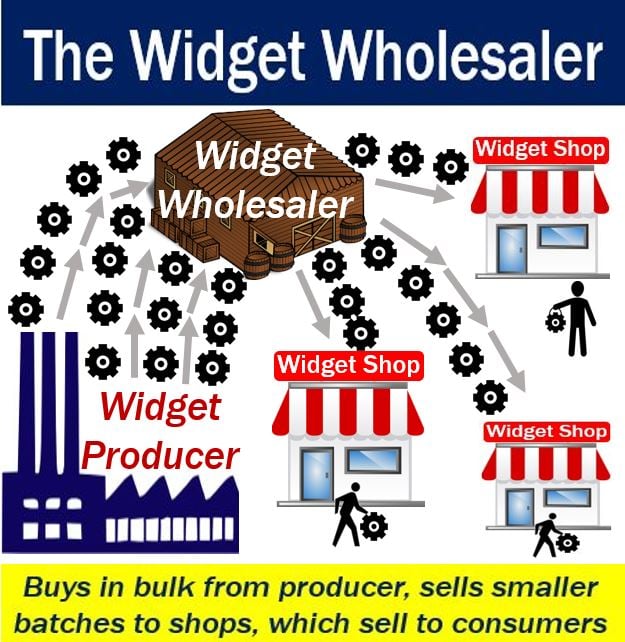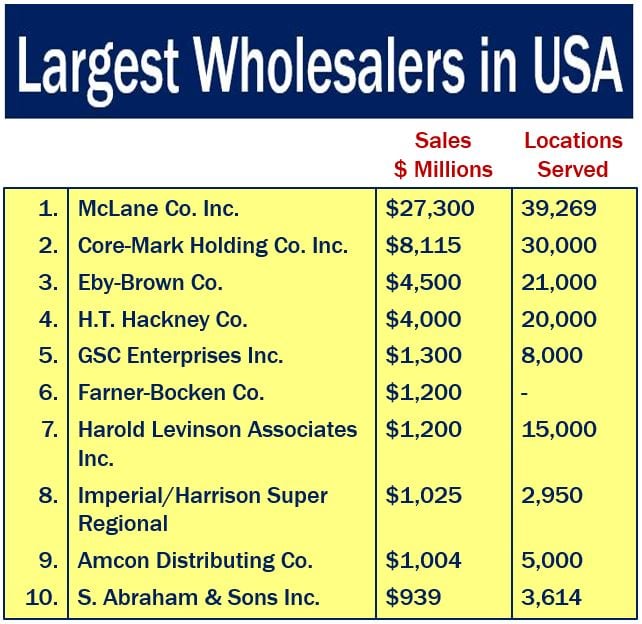A Wholesaler is a company or individual that purchases great quantities of products from manufacturers, farmers, other producers, and vendors. Wholesalers store them in warehouses and sell them on to retailers (shops and supermarkets) and businesses.
By managing inventory and providing storage solutions, wholesalers alleviate the need for retailers to maintain large storage spaces, which can be cost-prohibitive.
The merchant middlemen
Wholesalers are the merchant middlemen who sell mainly to retailers, other merchants, and commercial, industrial, or institutional users. They buy principally for resale or business use.
The wholesaler’s business model is based on being the intermediary – the go-between. They operate between a product’s manufacturer and other businesses that want to sell that product.
Wholesalers focus on B2B rather than B2C. B2B stands for business-to-business, i.e., one company selling to another company. B2C stands for business-to-consumer. Retailers, for example, focus on B2C.

We call the price at while wholesalers sell to retailers the wholesale price.
Wholesaler vs. distributor
We call a wholesaler who carries only non-competing lines or products a distributor. Distributors generally perform similar roles to wholesalers. However, distributors tend to provide more complex services.
Unlike official distributors of a product, most wholesalers do not offer high levels of product support. While distributors are supported directly by the producer, in most cases the wholesalers are not.
While wholesalers may sell competing products simultaneously – such as rival brands of toothpaste – distributors do not.
Wholesalers do not sell to individual consumers. If you – an individual consumer – want to purchase something for personal use, you cannot buy it from a wholesaler You have to go to a retailer.
Etymology of ‘wholesale’
The Online Etymology Dictionary says that the adjective ‘Wholesale’ dates back to 15th-century Britain, with the meaning ‘in large quantities.’ It came from the adjective ‘Whole’ plus ‘Sale.’
Etymology is the study of the origin of words and how their forms and meanings have evolved.

Wholesaler buys in bulk
Wholesalers buy goods in bulk, i.e., very large quantities. Typically, they reassemble, sort, repackage, or distribute the products in smaller units.
As they purchase goods in much greater quantities than we do in the shops, they pay a much lower unit price.
The wholesaler needs to buy more cheaply from producers than it sells on to retailers because it needs to make a profit to survive as a business.
The difference between how much somebody paid for something compared to how much they sold it for is the margin. We call the increase in price the markup.
While wholesalers generally operate from independent premises, wholesale marketing of some goods takes place at specific markets.
For example, foodstuffs are commonly sold in wholesale markets where many traders congregate.
Why use a wholesaler?
Imagine you own a small business that sells mobile phone covers/protectors. On average, you sell 500 covers each month.
You find a mobile phone cover manufacturer that will sell all the units you want to resell at $9 each. However, consumers are not willing to pay more than $11 for each one, which gives you a tiny $2 profit on each sale.
If you want to earn more than $1,000 per month, you are going to have to either sell in much larger numbers or find a significantly cheaper supplier.
A phone cover wholesaler, however, who purchases 100,000 phone covers each month from the manufacturer, gets them at a much lower price – $2.50 each.
That wholesaler is willing to sell you 500 phone covers monthly at $4.50 each. Now, your profit (margin) – if you sell them for $11 – is $6.50 per cover.
That’s a big increase from your previous profit per cover of just $2. Thanks to the wholesaler, your monthly profit has jumped from $1,000 to $3,250.
In addition to cost savings, wholesalers can also offer retailers flexible payment terms, which can ease cash flow for businesses looking to manage their finances more effectively.
